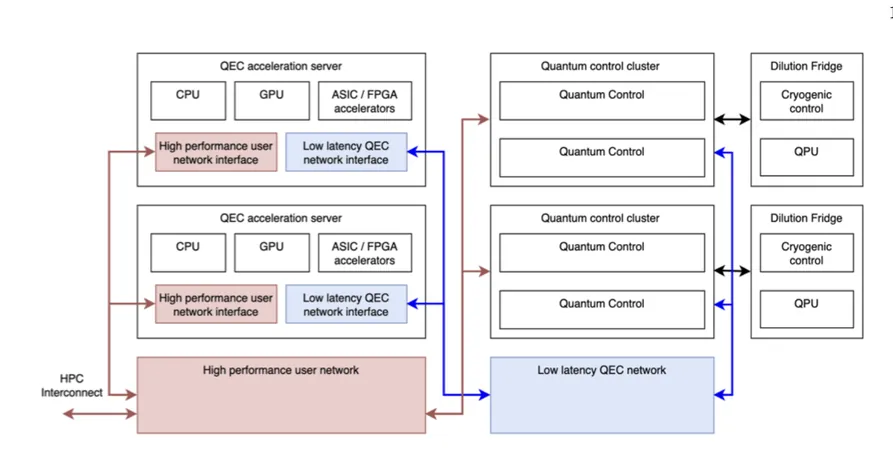
Unlocking the Future: A Groundbreaking Roadmap for Quantum Supercomputers Revealed!
2024-11-18
Author: Sarah
Unlocking the Future: A Groundbreaking Roadmap for Quantum Supercomputers Revealed!
In an exciting development for tech enthusiasts and researchers alike, a new study presents an ambitious and detailed roadmap for constructing utility-scale quantum supercomputers. By synergizing quantum processors with classical high-performance computing (HPC) systems, this pioneering approach promises to unleash unprecedented computational capabilities.
The research team, comprising experts from renowned establishments like Hewlett Packard Labs, NASA Ames, and the University of Wisconsin, underscores the significance of hybrid quantum-classical systems, advanced qubit fabrication methods, and robust error correction techniques. These elements are deemed crucial for scaling quantum devices to handle millions of qubits, effectively merging the best of both worlds.
Quantum computing has shown remarkable potential in applications like molecular simulations, especially in the realm of quantum chemistry, where it can significantly reduce resource demands by up to 100 times. This leap showcases how quantum supercomputers could revolutionize fields such as drug development, optimization, and cryptography, opening up pathways once considered impossible.
Insights from the Study: Bridging Quantum and Classical
Titled "How to Build a Quantum Supercomputer," the study details strategic pathways for scaling quantum computers into supercomputers capable of tackling problems that classical machines cannot address. The researchers propose treating quantum computers not as alternatives but as powerful accelerators within existing HPC systems, vital for achieving practical utility.
Among the significant challenges they highlight are:
1. **Qubit Quality and Fabrication**: The study calls for sophisticated semiconductor techniques to ensure the production of high-fidelity qubits. Unlike traditional computers, qubits are highly sensitive and error-prone, which can degrade overall performance when fabricated inconsistently.
2. **Hybrid Quantum-Classical Systems**: Leveraging the strengths of both quantum and classical processors, the researchers argue that hybrid systems could manage data processing more efficiently and overcome existing bottlenecks.
3. **Fault-Tolerant Design**: The implementation of quantum error correction is essential to maintain operational efficacy. Novel methods, such as integrating quantum decoders with GPUs for real-time error management, are suggested to advance this aspect significantly.
4. **Wafer-Scale Integration**: The teams recommend adopting wafer-scale techniques from semiconductor manufacturing to incorporate thousands of qubits onto a single chip, which will enhance efficiency and reduce latency.
As quantum research progresses, the goal is to transition from today’s noisy intermediate-scale quantum (NISQ) systems to error-corrected, fault-tolerant architectures that can handle millions of qubits and perform complex computations.
The Road Ahead: Tackling Technical Hurdles
Building large-scale quantum systems is fraught with technical challenges. From hardware limitations at small scales, where qubit performance variability can lead to major issues, to the intricate logistics involved at larger scales, researchers must navigate a complex landscape.
The study delineates the necessity for innovative solutions, from enhancing qubit fabrication processes to developing new error correction codes capable of functioning under the unique demands of large-scale quantum systems.
In addition, collaborative efforts across industries, emphasizing partnerships between quantum startups, semiconductor manufacturers, and HPC developers, are critical to accelerate progress in this burgeoning field.
What Lies Beyond?
Clearly, the researchers advocate for a concerted effort to standardize architectural designs, foster collaborative consortia, and innovate on quantum algorithms to ensure successful integration into classical computing frameworks. As quantum technology matures, the potential applications are vast, indicating a transformational shift in how we approach complex problems in science and industry.
The publication of this roadmap is not just a technical milestone; it heralds a new era for computing, suggesting that soon, problems we considered insurmountable may be addressed with a click of a button on a quantum supercomputer!
With global collaboration and significant resources directed towards overcoming these challenges, the dream of creating utility-scale quantum computing may soon become a reality. Stay tuned as the world awaits this groundbreaking advancement!

 Brasil (PT)
Brasil (PT)
 Canada (EN)
Canada (EN)
 Chile (ES)
Chile (ES)
 España (ES)
España (ES)
 France (FR)
France (FR)
 Hong Kong (EN)
Hong Kong (EN)
 Italia (IT)
Italia (IT)
 日本 (JA)
日本 (JA)
 Magyarország (HU)
Magyarország (HU)
 Norge (NO)
Norge (NO)
 Polska (PL)
Polska (PL)
 Schweiz (DE)
Schweiz (DE)
 Singapore (EN)
Singapore (EN)
 Sverige (SV)
Sverige (SV)
 Suomi (FI)
Suomi (FI)
 Türkiye (TR)
Türkiye (TR)